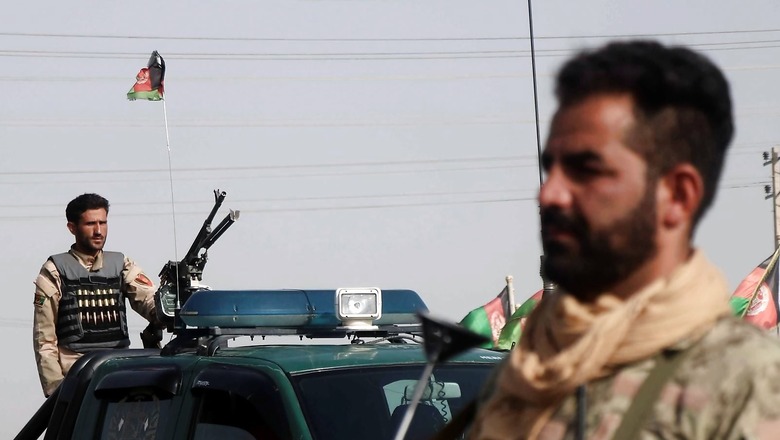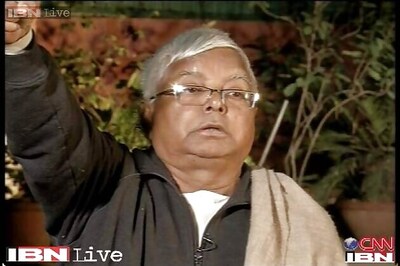
views
As the Taliban makes advances across Afghanistan capturing villages and key provincial capital, the US prepares to complete its withdrawal from the country before the end of the month. Tens of thousands of people have fled their homes in northern Afghanistan to escape battles that have overwhelmed their towns and villages as government forces try to fend off rapidly advancing Taliban forces. Families have flowed into the capital, Kabul, living in parks and streets with little food or water.
Families described on Tuesday bombardment, gunfire and airstrikes pounding their neighbourhoods in multiple parts of the north, with civilians caught in the crossfire. Some said that as the Taliban captured towns, they hunted down and killed male relatives of members of the police forces and quickly started imposing new restrictions on women.
Such atrocities have fueled alarm over a potential Taliban takeover of Afghanistan as the insurgents accelerate their advance capturing main cities for the first time in recent weeks. But some of those who fled were equally furious at the government. With the Taliban making key advances across provinces and the Afghan government left without support from the US, here are some key takeaways from the war-torn country:
Biden Rules Out Change in Troop Withdrawal
US President Joe Biden Tuesday ruled out any change in the withdrawal of his troops from Afghanistan despite the Taliban increasingly gaining control over large parts of the country. President Biden has ordered the withdrawal of all the US troops from Afghanistan by September 11. The Pentagon says it has already withdrawn more than 90 per cent of its troops from the war-ravaged country.
No, Biden told reporters at the White House when asked if his current plan to withdraw troops could change at all. Look, we spent over a trillion dollars over 20 years. We trained and equipped over 300,000 Afghan forces. Afghan leaders have to come together. We lost thousands — lost to death and injury — thousands of American personnel. They’ve got to fight for themselves, fight for their nation, he asserted.
Biden said the Afghans are beginning to realize they’ve got to come together politically at the top. But we are going to continue to keep our commitment. But I do not regret my decision, he said.
Zalmay Khalilzad’s oversights?
As Taliban advances and US withdraws, the focus has landed on Zalmay Khalilzad. Khalilzad is an Afghan-born US special representative for Afghanistan reconciliation. Khalilzad, known as the architect of the US-Taliban deal for an American troop pullout, had insisted in the past that the Taliban had changed and said that they were not the same group who deceived the Clinton administration in pre-9/11 diplomacy. He had said the Afghan government is too weak to win a negotiated settlement without a new military strategy and added that it’s now necessary for the government to find its “military bearings” with the Taliban surging.
But now Khalilzad has painted a bleak picture of the peace process and said that “at this point, they are demanding that they take the lion’s share of power in the next government given the military situation as they see it.” Experts have also pointed out to Khalilzad’s failure and insist its time to recall Khalilzad home. “His judgment proved wrong, and he has lost control of the process. Rather than interfere where Afghans no longer want him, it is time to investigate the intelligence failures, poor assumptions, and misjudgments that tainted the peace process from day one,” Michael Rubin, a senior fellow at the American Enterprise Institute, wrote in an opinion piece in the Washington Examiner.
Some Experts Against Peace Negotiations
Some experts have suggested against peace negotiations with Taliban saying that Afghanistan is now experiencing the pangs of US withdrawal as Taliban has unleashed a reign of terror in the areas under its control. In an article in The Print, Lt Gen (retd) Dr Prakash Menon is Director, Strategic Studies Programme, Takshashila Institution; former Military Adviser, National Security Council Secretariat referred to the peace settlement as a pact with the devil.
“In the short term, the Taliban may give assurance to assuage such a threat, but it is a gamble that could well bite back at the regional and global level in the long term. China has enough levers with Pakistan but has instead chosen to pursue a negotiated settlement with the Taliban,” Menon wrote. He added that the international community must stop sitting on the fence and take sides with the objective of reeling back the Taliban and hastening its eventual demise.
Uzbekistan and Pakistan Help Stabilise Afghanistan?
Pakistan is often seen as key to peace in Afghanistan. The Taliban leadership is headquartered in Pakistan and Islamabad has used its leverage, which it says is now waning, to press the Taliban to talk peace. Some experts suggest that Afghanistan’s neighbours- Uzbekistan and Pakistan could play a significant role in the stabilisation of the war-torn country. An article in The Diplomat suggested that two countries could optimize the trade routes that will grow their economies and, hopefully, stabilize Afghanistan by making it part of the regional trade regime.
The report went on to suggest that the US providing a platform to the Central Asian countries and U.S.-Afghanistan-Uzbekistan-Pakistan Quad, a diplomatic platform “focused on enhancing regional connectivity” could encouraged “long-term peace and stability in Afghanistan”. It goes on to add that peace and stability through regional trade could be a prerequisite for regional connectivity.
Read all the Latest News, Breaking News and Coronavirus News here.



















Comments
0 comment